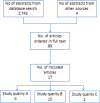Does high sugar consumption exacerbate cardiometabolic risk factors and increase the risk of type 2 diabetes and cardiovascular disease?
- PMID: 22855643
- PMCID: PMC3409338
- DOI: 10.3402/fnr.v56i0.19104
Does high sugar consumption exacerbate cardiometabolic risk factors and increase the risk of type 2 diabetes and cardiovascular disease?
Abstract
Consumption of sugar has been relatively high in the Nordic countries; the impact of sugar intake on metabolic risk factors and related diseases has been debated. The objectives were to assess the effect of sugar intake (sugar-sweetened beverages, sucrose and fructose) on association with type 2 diabetes, cardiovascular disease and related metabolic risk factors (impaired glucose tolerance, insulin sensitivity, dyslipidemia, blood pressure, uric acid, inflammation markers), and on all-cause mortality, through a systematic review of prospective cohort studies and randomised controlled intervention studies published between January 2000 and search dates. The methods adopted were as follows: the first search was run in PubMed in October 2010. A second search with uric acid as risk marker was run in April 2011. The total search strategy was rerun in April 2011 in SveMed+. An update was run in PubMed in January 2012. Two authors independently selected studies for inclusion from the 2,743 abstracts according to predefined eligibility criteria. The outcome was that out of the 17 studies extracted, 15 were prospective cohort studies and two were randomised controlled crossover trials. All of the studies included only adults. With respect to incident type 2 diabetes (nine studies), four of six prospective cohort studies found a significant positive association for sugar-sweetened beverage intake. In general, larger cohort studies with longer follow-up more often reported positive associations, and BMI seemed to mediate part of the increased risk. For other metabolic or cardiovascular risk factors or outcomes, too few studies have been published to draw conclusions. In conclusion, data from prospective cohort studies published in the years 2000-2011 suggest that sugar-sweetened beverages probably increase the risk of type 2 diabetes. For related metabolic risk factors, cardiovascular disease or all-cause mortality and other types of sugars, too few studies were available to draw conclusions.
Keywords: Nordic nutrition recommendations; fructose; sugar; sugar-sweetened beverages; systematic review.
Similar articles
-
The associations of sugar-sweetened, artificially sweetened and naturally sweet juices with all-cause mortality in 198,285 UK Biobank participants: a prospective cohort study.BMC Med. 2020 Apr 24;18(1):97. doi: 10.1186/s12916-020-01554-5. BMC Med. 2020. PMID: 32326961 Free PMC article.
-
The relationships between sugar-sweetened beverage intake and cardiometabolic markers in young children.J Acad Nutr Diet. 2013 Feb;113(2):219-27. doi: 10.1016/j.jand.2012.10.020. J Acad Nutr Diet. 2013. PMID: 23351625 Free PMC article.
-
Effects of high and low sucrose-containing beverages on blood glucose and hypoglycemic-like symptoms.Physiol Behav. 2020 Aug 1;222:112916. doi: 10.1016/j.physbeh.2020.112916. Epub 2020 May 13. Physiol Behav. 2020. PMID: 32416157
-
French Recommendations for Sugar Intake in Adults: A Novel Approach Chosen by ANSES.Nutrients. 2018 Jul 29;10(8):989. doi: 10.3390/nu10080989. Nutrients. 2018. PMID: 30060614 Free PMC article. Review.
-
Association of added sugar intake with all-cause and cardiovascular disease mortality: a systematic review of cohort studies.Nutr Res Pract. 2022 May;16(Suppl 1):S21-S36. doi: 10.4162/nrp.2022.16.S1.S21. Epub 2022 Feb 17. Nutr Res Pract. 2022. PMID: 35651837 Free PMC article. Review.
Cited by
-
Carbohydrates - a scoping review for Nordic Nutrition Recommendations 2023.Food Nutr Res. 2023 Nov 10;67. doi: 10.29219/fnr.v67.10226. eCollection 2023. Food Nutr Res. 2023. PMID: 38084156 Free PMC article. Review.
-
Physiological risk factors for cardiovascular disease in middle-aged (40-60 year) adults and their association with dietary intake, Northern Iran.Caspian J Intern Med. 2019 Winter;10(1):55-64. doi: 10.22088/cjim.10.1.55. Caspian J Intern Med. 2019. PMID: 30858942 Free PMC article.
-
Food & Nutrition Research towards 2013 and onwards.Food Nutr Res. 2012;56. doi: 10.3402/fnr.v56i0.19230. Epub 2012 Aug 13. Food Nutr Res. 2012. PMID: 22893782 Free PMC article. No abstract available.
-
Dietary carbohydrates: a review of international recommendations and the methods used to derive them.Eur J Clin Nutr. 2018 Dec;72(12):1625-1643. doi: 10.1038/s41430-017-0035-4. Epub 2018 Apr 25. Eur J Clin Nutr. 2018. PMID: 29572552 Free PMC article. Review.
-
Dose-response association between sugar- and artificially sweetened beverage consumption and the risk of metabolic syndrome: a meta-analysis of population-based epidemiological studies.Public Health Nutr. 2021 Aug;24(12):3892-3904. doi: 10.1017/S1368980020003614. Epub 2020 Oct 28. Public Health Nutr. 2021. PMID: 33109289 Free PMC article.
References
-
- Nordic nutrition recommendations 2004. Integrating nutrition and physical activity. 4th ed. Copenhagen: Nordic Council of Ministers; 2004.
-
- USDA's Nutrition Evidence Library (NEL) Alexandria, VA, USA: USDA Center for Nutrition Policy and Promotion; 2010. Available from: http://www.nutritionevidencelibrary.com.
-
- Dietary Guidelines Advisory Committee. Carbohydrates. Report of the Dietary Guidelines Advisory Committee on the Dietary Guidelines for Americans; Washington, DC: US Department of Agriculture, Agricultural Research Service; 2010. pp. 286–325.
-
- European Food Safety Authority. Scientific opinion on dietary reference values for carbohydrates and dietary fiber. EFSA J. 2010;8:1462.
LinkOut - more resources
Full Text Sources
Miscellaneous


